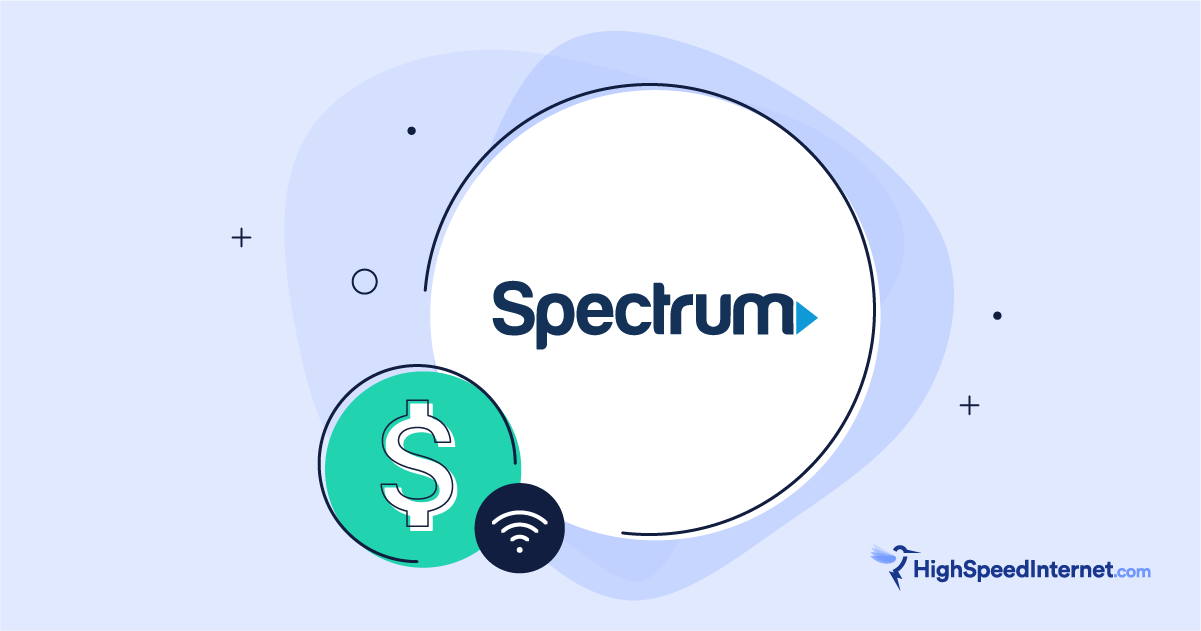The Best Internet for VR Gaming, Streaming, and More
Oct 9, 2025 | Share
Internet Buying Guides
-
Lowest latencyVerizon Fios
- Prices: $49.99–$109.00/mo.‡
- Speeds: 300–2,300Mbps
- Avg. latency: 13.28 ms
- Lowest latency
- Symmetrical speeds
- Equipment fees
-
Google Fiber
- Prices: $70.00–$150.00/mo.*
- Speeds: 1,000–8,000Mbps
- Avg. latency: 25.03 ms
- Multi-gig speeds
- No extra fees
- Limited availability
-
AT&T
- Prices: $55.00–$245.00/mo.†
- Speeds: 100–5,000Mbps
- Avg. latency: 24.67 ms
- Fair prices
- Growing fiber availability
- Slow DSL speeds
-
Xfinity
- Prices: Starting at $40/mo.§
- Speeds: Starting at 300Mbps
- Avg. latency: 23.45 ms
- Budget options
- Wide availability
- Data caps on all plans
-
Spectrum
- Prices: $25–$70/mo.║
for 12 mos. - Speeds: Up to 50–1,000Mbps
- Avg. latency: 33.40 ms
- Gigabit options
- Nationwide availability
- Price hikes on plans
- Prices: $25–$70/mo.║
Read disclaimers.
Virtual reality (VR) needs a lot of computing firepower to work well—and you need reliable internet too. Aside from the actual VR or AR headset and a powerful computer, you need a consistent, low-latency internet connection to ensure smooth gameplay and consistent VR video.
A fiber or cable internet plan works best for VR gaming and streaming: Either way, you get a connection that rarely drops out and a ping rate low enough to enhance your immersive experience—and reduce the chance of motion sickness. VR consumes a lot of data, so it also helps to have an unlimited data plan.
Take a look at our guide below to get the scoop on the best internet for your home VR setup.
Looking for reliable internet?
Run a search with your zip code below to find an internet package in your area that gets you low latency and a steady connection.
Best internet providers for VR
| Plan | Starting price | Speed range | Avg. latency |
|---|---|---|---|
| Verizon Fios | $49.99/mo.‡ | 300–2,300Mbps | 13.28 ms |
| Google Fiber | $70/mo.* | 1,000–8,000Mbps | 25.03 ms |
| AT&T | $55.00–$245.00/mo.† | 100–5,000Mbps | 24.67 ms |
| Xfinity | Starting at $40/mo.§ for 12 mos. | 300–1,200Mbps | 23.45 ms |
| Spectrum | $25–$70/mo.║ for 12 mos. | 50–1,000Mbps | 33.40 ms |
Read disclaimers.
You don’t need the fastest speeds—you do need a reliable connection
As with non-VR gaming, you don’t need the fastest internet around to get solid performance out of your VR gear. What you need, most of all, is a reliable connection with low latency.
In most households, an internet speed of 100Mbps to 300Mbps is all you need to get in the rhythm of Beat Saber or take the epic plunge into Save Every Breath: The Dunkirk VR Experience. But you want an internet connection that stays consistent throughout the day, even in times of network congestion. A patchy connection can yank you out of the VR experience, turning an immersive wonderscape into a frozen image, unstable-connection warning, or blank screen.
Use Ethernet to double-down on reliability
Although it’s common for internet users to log on to their home networks using a wireless connection, you can maintain a more consistent VR connection when you plug your computer directly into your router using an Ethernet cable.
An Ethernet hookup—ideally using a CAT 7 or CAT 8 cable—gives you a noticeable boost in download and upload speeds. Just as importantly, it gives you a better quality of data transfer, vastly reducing the chance of signal interference, which is more likely to happen over Wi-Fi.
Pro tip: Get a CAT 8 cable for the fastest internet
You want to make sure your Ethernet cable can deliver speeds equal to or greater than your home internet network.
Need a cable recommendation? A CAT 8 Ethernet cable is the most recent Ethernet standard, and it can transfer data at industrial-strength speeds of up to 40Gbps. DbillionDa’s CAT 8 shielded Ethernet cable gives the best bang for your buck.
Low latency improves your VR experience
Just as a steady connection is important to ensure a fluid, immersive VR experience, so also is low latency for near-instantaneous response to motion controls.
What is latency—and why does it matter?
Latency (also known as ping rate) is the time it takes an internet signal to travel from your device to a server and back. Lower latency means your internet connection has a faster response time, which is crucial for many actions you take in VR—whether it’s turning your head to look down a street in Google Earth or swinging your arm to strike an opponent in Swordsman.
When latency is too high, you get lag: You may experience clunky images, delays between audio and video feeds, and other technical problems.
High latency is frustrating enough when you’re playing games online, but it’s worse when you’re plugged in to a VR headset. A laggy connection can make you nauseous, throw you off balance, and give you a massive headache.
Reasons to get low-latency internet:
- Increases response time of motion sensors
- Improves video and audio quality
- Facilitates fast-paced gaming
- Reduces chance of motion sickness
Pick fiber or cable internet for the best VR experience
A fiber or cable internet connection is a near necessity for getting the best experience possible out of a VR headset like the Meta Quest, PlayStation VR, or Apple Vision Pro.
Fiber internet has the lowest latency of all internet connection types, and it has symmetrical speeds that facilitate interactive virtual reality activities like multiplayer gaming and video chat. Cable internet isn’t quite as fast as fiber, but it gives you a strong and consistent signal.
| Connection type | Strengths for VR |
|---|---|
| Fiber internet |
|
| Cable internet |
|
Avoid 5G home internet, DSL, and satellite, if possible
We recommend avoiding fixed wireless internet connections like 5G home internet for VR. Although 5G home internet likely works well most of the time, you have a higher chance of experiencing connection slowdowns, technical issues, and other bugs that can wreak havoc on your next trip through the metaverse.
A 5G home internet connection runs over fixed wireless, meaning it pulls from cellular signals beamed from radio towers to give you Wi-Fi. Compared to the fixed broadband of fiber and cable, this wireless connection is less stable. Speeds and latency can fluctuate based on factors like network congestion and even weather.
This isn’t a complete dealbreaker for VR enthusiasts, but it’s not ideal. To avoid laggy VR connections, long load times, and stomach-churning clunkiness, you’re better off sticking with a fast, fixed broadband connection like cable or fiber.
DSL and satellite—even worse for VR
DSL and satellite don’t work well for VR because they have notoriously slow speeds and high latency.
A DSL connection can’t go much faster than 100Mbps (and often goes much slower). Satellite internet literally gets beamed down from space, so it has the highest latency of all internet types.
Even worse, satellite internet typically comes with strict data restrictions. So you’re much more likely to burn through a month’s worth of data in just a handful of VR gaming sessions, leading to crushing slowdowns of your internet speeds.
Unlimited data lets you do all the VR you want
Most internet providers put a cap on the amount of data you can use per month, which means you can stream only so many movies and download only so many games before you end up getting your speeds throttled or having your bill stuffed with overage fees.
This isn’t a problem for most internet users, but you want to be more attentive about your data usage when you frequently power up a VR or AR headset. Although gaming itself doesn’t use a whole lot of data, you can easily burn through a chunk of data with game downloads and updates. And streaming takes a massive amount of data too.
You can solve this potential problem outright by getting an internet plan with unlimited data. Some internet providers let you upgrade to an unlimited data plan for an extra monthly fee, while others offer unlimited data by default.
Internet providers that offer unlimited data:
- Verizon
- Google Fiber
- AT&T (fiber only)
- Spectrum
- Astound
- CenturyLink
- Frontier
- Optimum
Pro tip: Find a provider with unlimited data
Take a look at our guide to internet data caps for more info on which internet providers have unlimited data and which don’t.
Disclaimers
Best internet plans for VR (back to top)
*Plus taxes and fees. Upload/download speed and device streaming claims are based on maximum wired speeds. Actual Internet speeds are not guaranteed and may vary based on factors such as hardware and software limitations, latency, packet loss, etc.
†AT&T
- Price after $5/mo Autopay & Paperless bill discount (w/in 2 bills). Plus taxes & fees. Monthly State Cost Recovery Charge in TX, OH, NV applies. Ltd. availability/areas.
- Above pricing is after $10/mo Autopay & Paperless bill discount with a debit card or bank account; if using a credit card, then price is $5/mo more. Pricing includes Equipment Fee. Up to $99 install fee may apply, plus tax where applicable.
‡Price per month with Auto Pay & without select 5G mobile plans. Fios plan prices include taxes & fees. Consumer data usage is subject to the usage restrictions set forth in Verizon’s terms of service; visit: https://www.verizon.com/support/customer-agreement/ for more information about 5G Home and LTE Home Internet or https://www.verizon.com/about/terms-conditions/verizon-customer-agreement for Fios internet.
§ Xfinity
Pricing and plan names may vary by region. For 12 month, no term contract. Taxes and equipment not included. Incl. up to $10/mo. auto-pay & paperless bill discount.
║ Spectrum
- Offer based on eligibility requirements. Standard rates apply after promo period. Additional charge for installation. Speeds based on wired connection. Actual speeds (including wireless) vary and are not guaranteed. Services subject to all applicable service terms and conditions, subject to change. Not available in all areas. Restrictions apply.
-
Limited time offer; subject to change; new residential customers only (no Spectrum services within past 30 days) and in good standing with Spectrum. Taxes and fees extra in select states. SPECTRUM INTERNET: Standard rates apply after promo period. Additional charge for installation. Speeds based on wired connection. Actual speeds (including wireless) vary and are not guaranteed. Gig capable modem required for Gig speed. For a list of Gig capable modems, visit spectrum.net/modem. Services subject to all applicable service terms and conditions, subject to change. Not available in all areas. Restrictions apply.
Best internet plans for VR (back to top)
*Plus taxes and fees. Upload/download speed and device streaming claims are based on maximum wired speeds. Actual Internet speeds are not guaranteed and may vary based on factors such as hardware and software limitations, latency, packet loss, etc.
†AT&T
- Price after $5/mo Autopay & Paperless bill discount (w/in 2 bills). Plus taxes & fees. Monthly State Cost Recovery Charge in TX, OH, NV applies. Ltd. availability/areas.
- Above pricing is after $10/mo Autopay & Paperless bill discount with a debit card or bank account; if using a credit card, then price is $5/mo more. Pricing includes Equipment Fee. Up to $99 install fee may apply, plus tax where applicable.
‡Price per month with Auto Pay & without select 5G mobile plans. Fios plan prices include taxes & fees. Consumer data usage is subject to the usage restrictions set forth in Verizon’s terms of service; visit: https://www.verizon.com/support/customer-agreement/ for more information about 5G Home and LTE Home Internet or https://www.verizon.com/about/terms-conditions/verizon-customer-agreement for Fios internet.
§ Xfinity
Pricing and plan names may vary by region. For 12 month, no term contract. Taxes and equipment not included. Incl. up to $10/mo. auto-pay & paperless bill discount.
║ Spectrum
-
Offer based on eligibility requirements. Standard rates apply after promo period. Additional charge for installation. Speeds based on wired connection. Actual speeds (including wireless) vary and are not guaranteed. Services subject to all applicable service terms and conditions, subject to change. Not available in all areas. Restrictions apply.
-
Limited time offer; subject to change; new residential customers only (no Spectrum services within past 30 days) and in good standing with Spectrum. Taxes and fees extra in select states. SPECTRUM INTERNET: Standard rates apply after promo period. Additional charge for installation. Speeds based on wired connection. Actual speeds (including wireless) vary and are not guaranteed. Gig capable modem required for Gig speed. For a list of Gig capable modems, visit spectrum.net/modem. Services subject to all applicable service terms and conditions, subject to change. Not available in all areas. Restrictions apply.
Author - Peter Holslin
Peter Holslin has more than a decade of experience working as a writer and freelance journalist. He graduated with a BA in liberal arts and journalism from New York City’s The New School University in 2008 and went on to contribute to publications like Rolling Stone, VICE, BuzzFeed, and countless others. At HighSpeedInternet.com, he focuses on covering 5G, nerding out about frequency bands and virtual RAN, and producing reviews on emerging services like 5G home internet. He also writes about internet providers and packages, hotspots, VPNs, and Wi-Fi troubleshooting.



